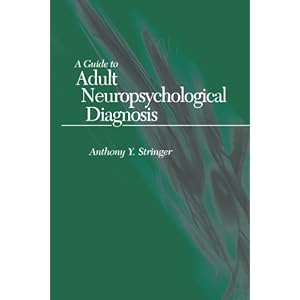 |
| Great for understanding the neuropsychological aspects of medical disorders (2010) ** |
 |
| Not little, but plenty of helpful content, and recent (2011). ** |
 |
| Lots of great chapters in this text on a wide range of topics, with handy suggestions for interventions ** |
 |
| Nice online resources supplement this practical volume ** |
 |
| An Australian book. Eloquent, amusing, and informative, with an excellent chapter at the end about six not-so-easy clinical dilemmas. Thanks Simon! ** |
| (2003) Great for neuropsychologists who are fascinated by Bayesian analyses and statistics. Good for others to consider as well. From the preface: "Considerable controversy exists between and within factions of neuropsychologists who hold any number of circumscribed views that they often attribute to the superiority of one training model over another. Difference include the number of tests to administer, which among the many available tests should be administered, and how administered tests should be interpreted. Some argue for a purely quantitative analysis where tests scores are compared against established standards. Others demand inclusion of qualitative measures, such as a patient's approach to the test or the way a patient constructs a drawing. Both approaches demonstrate merit. both present limitations. Common to each approach is a reliance on the scientific method for the formation and testing of hypotheses. This work explores scientific methods common to neuropsychological approaches for establishing diagnosis and predicting future or prior performances. Particular emphasis is placed on statistical methods that are readily available to clinical practitioners." (p. vii) |
| Another worthwhile book that considers important issues of ecological validity |
 |
| A guide to making neuropsychological assessment a therapeutic endeavour, particularly useful for those who aren't entirely comfortable with giving feedback. |
| Important summary of ethical issues across the lifespan and different neuropsychological practice settings, illustrated by case vignettes. |
| More ethical vignettes, demonstrating that ethical issues are not simple and that they can arise anywhere. |
| A more recent book than the two above, and a nice overview. |
| Neuropsychologists really need to read about contemporary cognitive research. It might save lots of efforts in developing new tests of "executive functioning" (aka Gf), and in helping us to understand the factors underlying performance on cognitive tests. This book, from 2000, is a good start. We can learn a lot about cognition from studying healthy brains. A lot of patients we see have not suffered brain injuries, and we're being asked about the state of their brain function. The one below is a more recent addition. |
 |
| On my Christmas wish list. I loaned my second edition copy to someone and never got it back. Oh, and I'd like a working one of these, so that I could have enough time to read everything that I want to! |
